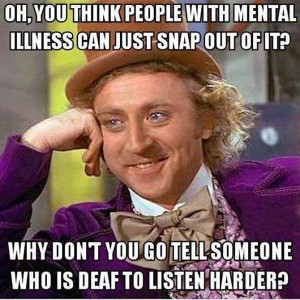I know I have brought up therapy before in passing in previous blog posts regarding our journey to healthy living. I don’t know how I can every emphasize enough that medication without therapy is not the optimum solution. It is proven time and time again that you need a full body/mind/soul examination to get on the road to becoming healthy on a LONG TERM BASIS. I can tell you right now, I speak from experience. Not the personal experience of a person unwell, but of the person standing there wishing they could do more but watching while an unbalanced plan simply falls to pieces.
This is not my first rodeo as they say… In the span of my relationship/marriage to Ken this is the SECOND time we have experienced the severe lows of full blown depression. The first time (which is years ago now) we began on the right path. He took himself into the doctor to explain things just weren’t right, he was put on medication (Zoloft or some sort of like brand has, and still works best for him) and taken to a counselor. This is terrific, we were able to stop the world and get him help. BUT in Alberta at the time, this was a stop gap. Said counselor would then (on the psychiatrist’s recommendation) find him some sort of group or continuing therapy within the confines of our location and basic healthcare.
The reality of this is that not all locations are equal. Not every area has enough therapists, or even psychiatrists. I have had friends who simply saw their GP for all medical managing. Ken was placed in an AMAZING group therapy program that worked wonders… for a time… and then the doctor in charge was transferred and the rug was pulled out of the program. Job done, keep seeing your GP, maybe a psychiatrist and we will hope for the best. The reality of that is that it was NOT the best… When someone has not seen a therapist or entered into some sort of counselling program, while the medication may be helping and the severe thoughts quieted, that person is NOT healthy. They are on the path but just like a long hike has signs and tour guides… you don’t drop a depressed person an a stack of pills and say… Cool you be good now.
Left to their own devices are they going to take that necessary medication? Without dealing with the issues that have led them to the horrible compulsions and thoughts do you really think they are just going to poof away because they alerted one doctor (or maybe more) that something isn’t quite right?
We don’t expect cancer patients to just become healthy after a treatment, there is follow up. We shouldn’t expect people suffering from anxiety, depression, bi polar disorders to struggle alone. And that is where therapy comes in. Now I am all for sharing with friends and family. As Ken says – Sharing is Caring… (and then we all groan and I have to hold myself back from decking him), but when you share with a loved one or a close connection there is the risk of holding back (for their benefit and your), the fear of rejection… therapy comes without those stumbling blocks.
Not everyone, as I mentioned before, can afford/access therapy. BUT there are options… if you are religious (or at least open to religion) there are many churches where the minister or someone else within the church who can be your sympathetic ear. That is what they are there for. I, myself have talked to my fair share of ministers throughout my life. They have been a support and a safe place for me during many tumultuous times. Often you can go into your county offices… public health in Canada… they will have posting, pamphlets or even a knowledgeable person who can work out your options. We have found many therapists actually have a sliding scale according to your wage and circumstances.
More and more people are trying online or e-therapy. I do not know much about this version of therapy other than it is a way for people who simply cannot make it in person to carve out an hour and skype and interface with a trained therapist over the computer. Talkspace.com has an explanation with the main reasons why someone may chose this option HERE. In the end what is important is a connection on some level with the person you are talking to. If you can find that via Skype and that works for you, job done. There is further discussion at the bottom of the page linked about TEXTING therapy. I do not know anything about that, nor have I done any research, but I stand by my statement… the form that works for you is SUCCESS not what works for the other people around you.
There is no shame in asking questions. NEVER feel ashamed for working within your own resources to get the very best help you can get.
Of course there is more to therapy than just finding an office. You really do need a good connection with your therapist. We really lucked out with Ken’s she is accepting of his rather, unique humour… she acknowledges and supports our homeschooling and has even worked to implement it into his therapy (creating a deeper connection and healing some of the wounds inadvertently made as he fell into a deeper depression previously)… the connection he forges with her allows him total honesty and in turn we have seen him accept her direction fully and work to truly create a sustainable lifestyle of new patterns and coping skills. This is all possible by a COMBINATION of medication, therapy and the WILL/WISH to be well.
I really want to emphasize this… all these measures, medications and external support are going to come for naught if the person in question does not WANT to be healthy. Therapy is a vehicle to get you on your way but you have to put in the effort (gas) and steer yourself. It is up to the rest of us to work hard to remove the taboo and the fear and disgust some people still see as attached to the idea of seeing help from a professional. I believe it is up to us to educate ourselves and our children on how amazing and productive this choice is. There is nothing to be embarrassed about when you have the strength and the will to seek help. Instead we need to embrace these individuals, celebrate the step and share our experiences. I have seen time and time again when we mention our love of Ken’s therapist that others feel they too can open up or even ask where he goes. It scares and saddens me to think that there are people out there suffering in silence because they don’t feel that they can seek help.
So let’s see… sum up… medication alone is not the optimum way to treat mental disorders… therapy is an amazing tool… there are many versions of therapy and many providers… find what works best and is most affordable for you and RUN WITH IT… therapy is something to be proud of (you have made a huge step and sought help)… this is something we need to teach ourselves and our children…
And as always… our home is open, our love is here and you are NOT alone. Take heart, the journey may feel long and difficult but you don’t have to travel it alone. We love you! Please feel free to share information or suggestions in the comments. I try to check them as often as I can. I could not resist sharing this little meme… There is work to be done and not just for those who are suffering… we need to learn to acknowledge the struggle and not expect them to just… snap out of it.
